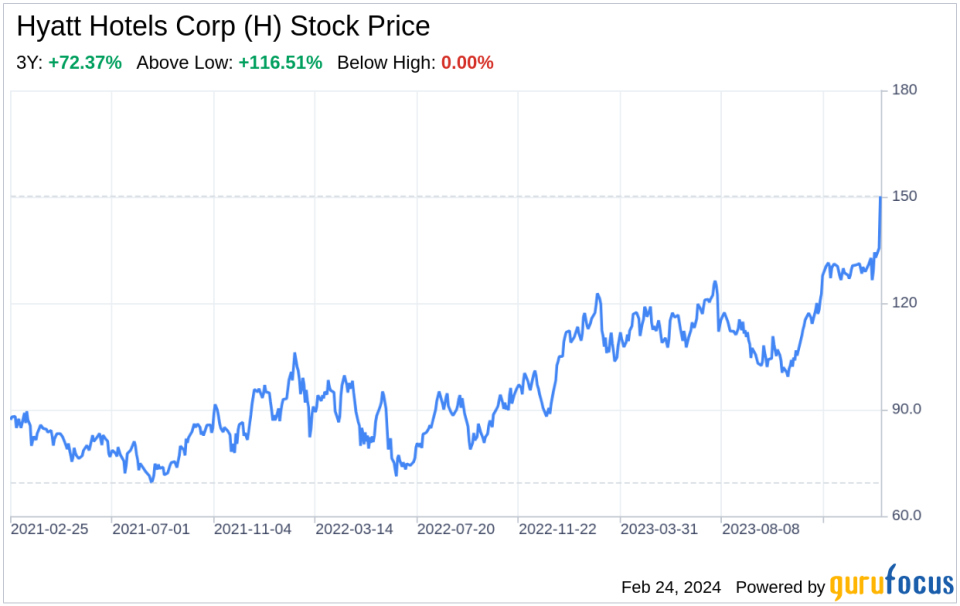Decoding Hyatt Hotels Corp (H): A Strategic SWOT Insight
Hyatt's robust brand portfolio and global presence position it strongly in the luxury segment.
Strategic dispositions and acquisitions reflect a disciplined capital allocation approach.
Operational risks such as geopolitical tensions and pandemics pose significant threats.
Technology and cybersecurity remain pivotal areas for safeguarding brand reputation.
On February 23, 2024, Hyatt Hotels Corp (NYSE:H) released its 10-K filing, offering a comprehensive view of its financial performance and strategic direction. Hyatt, known for its upscale luxury brands, operates a global portfolio with a significant emphasis on managed and franchise properties, which account for 96% of its rooms. The company's financial health is underpinned by a strong capital base, with $896 million in cash and cash equivalents and a $1.5 billion credit facility. Hyatt's commitment to a disciplined financial approach is evident in its strategic dispositions, which have generated over $4.0 billion since 2017, including $961 million from the sale of owned assets. This financial overview sets the stage for a deeper SWOT analysis, providing investors with a nuanced understanding of Hyatt's market position and strategic outlook.

Strengths
Brand Portfolio and Market Positioning: Hyatt Hotels Corp (NYSE:H) has cultivated a diverse and distinct brand portfolio, which serves as a cornerstone of its competitive advantage. The company's brands, including Park Hyatt, Grand Hyatt, and Hyatt Regency, cater to the high-end segment across various markets, resonating with discerning travelers seeking luxury and sophistication. This brand strength is not just a testament to Hyatt's market positioning but also to its ability to innovate and adapt to evolving consumer preferences. The introduction of new concepts like Hyatt Centric and The Unbound Collection by Hyatt further demonstrates the company's commitment to brand differentiation and market penetration.
Global Presence and Growth Potential: With properties in 77 countries, Hyatt's global footprint is a testament to its expansive reach and potential for growth. The company's strategic presence in key urban centers and resort destinations provides a robust platform for expansion, particularly in markets where its brands have yet to establish a strong presence. This global platform is not only a strength in terms of market coverage but also in terms of growth potential, as Hyatt continues to pursue opportunities in underrepresented markets, thereby enhancing its global brand equity.
Weaknesses
Operational Risks and Market Sensitivity: The hospitality industry is inherently sensitive to external factors such as geopolitical tensions, natural disasters, and health crises like pandemics. Hyatt's 10-K filing acknowledges these risks, highlighting the potential for adverse impacts on travel demand and, consequently, the company's financial performance. While Hyatt has demonstrated resilience, the cyclical nature of the industry and the potential for sudden market disruptions remain significant weaknesses that require constant vigilance and adaptive strategies.
Reliance on Third-Party Relationships: Hyatt's business model, which emphasizes managed and franchise operations, inherently relies on the performance and capital access of third-party owners and franchisees. While this model offers scalability and reduced asset intensity, it also introduces a degree of vulnerability. Any financial instability among these partners could impede growth plans or lead to operational challenges, thus representing a weakness in Hyatt's otherwise robust business strategy.
Opportunities
Strategic Acquisitions and Brand Expansion: Hyatt's history of strategic acquisitions, such as the purchase of Apple Leisure Group, presents ongoing opportunities for growth and diversification. These acquisitions not only expand Hyatt's portfolio but also open up new markets and customer segments. The company's ability to successfully integrate these acquisitions and leverage their potential will be crucial in maintaining competitive momentum and driving long-term value creation.
Loyalty Program and Digital Engagement: The World of Hyatt loyalty program and the Unlimited Vacation Club membership program represent significant opportunities for deepening customer engagement and driving repeat business. By enhancing these programs and investing in digital platforms, Hyatt can strengthen brand loyalty, tailor guest experiences, and harness data analytics for strategic decision-making, thereby capitalizing on the growing trend of personalized travel experiences.
Threats
Competitive Landscape and Market Consolidation: The hospitality industry is marked by intense competition and ongoing consolidation. Hyatt faces the challenge of maintaining its market share and brand appeal amidst a landscape where competitors are constantly evolving and expanding through mergers and acquisitions. Staying ahead requires continuous innovation, investment in brand equity, and a keen understanding of shifting market dynamics.
Cybersecurity and Data Privacy: In an age where data is a critical asset, cybersecurity threats pose a significant risk to Hyatt's operations and reputation. The company's reliance on digital platforms and the storage of sensitive customer information necessitate robust cybersecurity measures. Any breach or failure in data protection could lead to reputational damage, legal repercussions, and financial losses, making cybersecurity a paramount concern for Hyatt.
In conclusion, Hyatt Hotels Corp (NYSE:H) exhibits a strong competitive position with its diverse brand portfolio and global presence. However, it must navigate operational risks and maintain strong third-party relationships to sustain its growth trajectory. Opportunities for expansion through strategic acquisitions and enhanced loyalty programs are counterbalanced by threats from a competitive market and cybersecurity risks. Hyatt's ability to leverage its strengths, address its weaknesses, seize opportunities, and mitigate threats will be critical in shaping its future success in the hospitality industry.
This article, generated by GuruFocus, is designed to provide general insights and is not tailored financial advice. Our commentary is rooted in historical data and analyst projections, utilizing an impartial methodology, and is not intended to serve as specific investment guidance. It does not formulate a recommendation to purchase or divest any stock and does not consider individual investment objectives or financial circumstances. Our objective is to deliver long-term, fundamental data-driven analysis. Be aware that our analysis might not incorporate the most recent, price-sensitive company announcements or qualitative information. GuruFocus holds no position in the stocks mentioned herein.
This article first appeared on GuruFocus.
